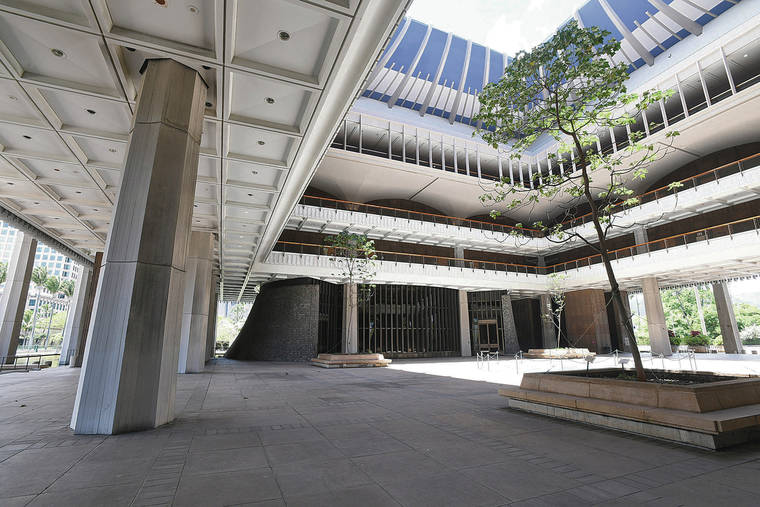Hawaii budget shortfall now projected to be $2.3 billion | Honolulu Star-Advertiser

Legislators plan to return to the state Capitol on June 15 to address how to spend the CARES Act funding and decide on budget cuts.
There was a lot of guesswork involved, but a panel of experts concluded Thursday that state tax collections will drop by 7% this fiscal year and another 12% next year, leaving Gov. David Ige’s administration with a whopping $2.3 billion budget hole to patch up.
Members of the state Council on Revenues, which is tasked with predicting how much the state will collect in taxes each year, said the shutdown of Hawaii’s economy during the COVID-19 pandemic has no precedent in the state’s economic history.
That makes it nearly impossible to accurately project how deep the recession will be or how long it might last, which depends in part on factors such as when a COVID-19 vaccine might be developed and when Hawaii tourism will reopen.
“Recession is an understatement, and the problem is that we’re now in the business of forecasting what viral science is going to be doing, and then we also have to forecast what the politicians are doing, and so it’s getting pretty crazy,” said Jack Suyderhoud, professor emeritus of business economics at the University of Hawaii’s Shidler College of Business. “Frankly, in this kind of environment, we’re guessing.”
But the council’s tax collection projection is the foundation of the state budget, and will drive spending and budget-cutting decisions by the Ige administration in the months ahead. The new projection means the state will collect $2.3 billion less in taxes in the next 13 months than the council predicted at its last meeting in March.
As it stands now, the total general treasury budget for next year is $8.4 billion, but Ige already has imposed spending restrictions.
Key lawmakers said Thursday that the state is positioned to cover all but about $400 million of the budget shortfall, but also suggested Ige should borrow money from the federal government to help pay the state’s bills in the year ahead.
The Legislature voted last week to stash about $1.3 billion in the state’s “rainy day” budget reserve fund, and “we think that at least for now we should be able to avoid some substantial or massive reductions,” said House Finance Chairwoman Sylvia Luke.
Lawmakers also authorized Ige to borrow up to $2.1 billion from the federal Municipal Liquidity Facility to help cover the cost of running the state, and are also hoping Congress will approve a new coronavirus relief measure that will help states and municipalities to cover their operating costs during the pandemic.
“Every state is struggling with this issue,” Luke said. She predicted that the economic downturn will be relatively brief and that state tax collections will bounce back and increase by 16% to 17% in the year that begins July 1, 2021.
“Because of that, the fix really is a short-term loan, and the federal government liquidity fund allows a three-year payback, because the federal government understands that this is a short-lived economic downturn coupled with a sharp increase” in economic activity in late 2021 and 2022, she said.
The Council on Revenues essentially agreed, and predicted state tax collections will rebound by 12% that year. Suyderhoud said his own economic model projected 13% growth in tax collections in the year that begins July 1, 2021.
When asked whether he is assuming there will be a vaccine by then, he replied, “I’m assuming that we’ll have figured out something by fiscal (year) ’22, and I’m not sure if it’s a vaccine, I’m not sure if it’s herd immunity, I don’t know.”
Ige told leaders from the state public worker unions last month that he planned to impose 20% pay cuts or furloughs to help cover the state budget shortfall.
That plan was immediately opposed by leading lawmakers including House Speaker Scott Saiki and Senate President Ron Kouchi, and lawmakers returned to the Capitol last week to approve a package of budget amendments, in part to demonstrate that public worker pay cuts are not necessary.
The $1.3 billion that lawmakers appropriated into the rainy day budget reserve fund included nearly $636 million in federal CARES Act money to provide relief from the pandemic. That move was criticized by some lawmakers and others who believe that money should have been quickly committed to rent subsidies, food aid and other support for people who have been thrown out of work.
Luke defended that decision Thursday, saying that money will be needed later. The extra $600 per week in unemployment benefits being provided by the federal government will expire, and “both Donovan (Dela Cruz) and I are very, very concerned about the few months ahead,” she said.
The Legislature plans to return to the state Capitol on June 15, and at that time will address the best way to spend the CARES Act funding as well as how to make additional budget cuts, lawmakers said.
“We’re just going to have to work hard to fill the puka,” said Dela Cruz, Senate Ways and Means Committee chairman, of the budget shortfall. “There’s going to have to be some strategic cuts; there’s going to have to be looking at (the money in) some special funds. The administration is also looking at some of the borrowing ability that we gave them.”